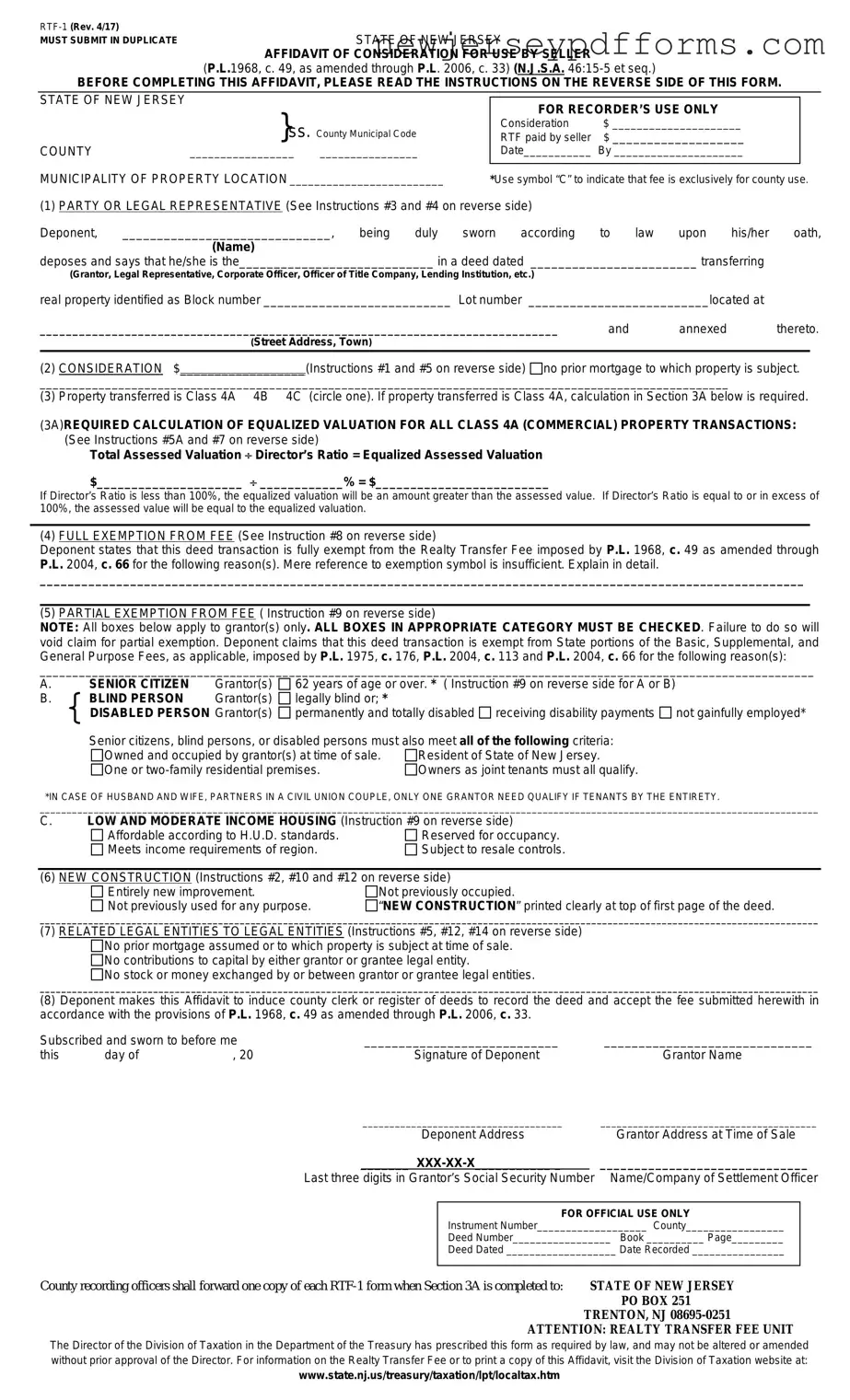The New Jersey Affidavit of Consideration RTF-1 form serves a specific purpose in real estate transactions, particularly in documenting the consideration exchanged in a sale. Similar to this form is the New Jersey Deed, which also plays a crucial role in property transfers. The deed provides a legal description of the property and outlines the parties involved in the transaction. While the Affidavit of Consideration focuses on the financial aspects, the deed serves as the official record of ownership transfer, ensuring that the transaction is legally binding and recognized by the state.
Another document that shares similarities with the RTF-1 form is the New Jersey Transfer Tax Declaration (Form PT-1). This form is required when real estate is sold or transferred and is used to report the sale price and calculate any applicable transfer taxes. Like the Affidavit of Consideration, the PT-1 form ensures transparency in the financial details of the transaction, making it easier for the state to assess taxes owed on property sales.
The New Jersey Property Tax Reimbursement Application is also akin to the RTF-1 form in its focus on financial considerations, albeit from a different angle. This application allows eligible homeowners to seek reimbursement for property taxes. While the Affidavit of Consideration documents the price paid during a sale, the reimbursement application addresses the ongoing financial obligations of property ownership, ensuring that homeowners receive the benefits they are entitled to.
In addition, the New Jersey Seller's Disclosure Statement is relevant in the context of real estate transactions. This document requires sellers to disclose any known issues with the property that could affect its value. While the Affidavit of Consideration records the sale price, the Seller's Disclosure Statement provides potential buyers with critical information about the property's condition, helping them make informed decisions.
The New Jersey Lease Agreement also bears some resemblance to the RTF-1 form, particularly in how it outlines financial considerations between parties. This document details the terms of rental arrangements, including rent amounts and payment schedules. While the Affidavit of Consideration pertains to sales, the Lease Agreement focuses on temporary financial commitments, ensuring that both landlords and tenants understand their obligations.
The New Jersey Mortgage Agreement is another document that aligns with the themes of the Affidavit of Consideration. This agreement outlines the terms under which a borrower receives funds to purchase property, including the amount borrowed and the interest rate. Like the RTF-1 form, the Mortgage Agreement is concerned with financial transactions and obligations, but it specifically addresses the borrowing aspect of property acquisition.
Similar in intent, the New Jersey Title Insurance Policy protects buyers against potential defects in property title. While the Affidavit of Consideration records the purchase price, the Title Insurance Policy ensures that the buyer's investment is safeguarded against unforeseen claims or liens on the property. Both documents play vital roles in the overall transaction process, focusing on different but complementary aspects of property ownership.
The New Jersey Bill of Sale is an important document for transferring ownership of personal property, and for those looking for additional resources, including templates, the PDF Document Service can be quite helpful. This form effectively serves as proof of the transaction, detailing information such as the description of the item sold and the purchase price, thus protecting the interests of both the buyer and seller. It is particularly essential in transactions involving vehicles, equipment, or other valuable items, ensuring clarity and legality in ownership transfers.
The New Jersey Affidavit of Title is another document that parallels the RTF-1 form. This affidavit is a sworn statement by the seller affirming their ownership of the property and disclosing any potential claims or issues. While the Affidavit of Consideration addresses the financial details of the transaction, the Affidavit of Title provides assurance to the buyer regarding the seller's right to sell the property, ensuring a smoother transaction process.
Lastly, the New Jersey Closing Statement is relevant in the context of real estate transactions. This document summarizes all the financial details involved in the closing process, including fees, credits, and the final purchase price. Similar to the Affidavit of Consideration, the Closing Statement provides a comprehensive overview of the financial aspects of the transaction, ensuring that all parties are clear about their financial commitments and any adjustments that may be necessary.

